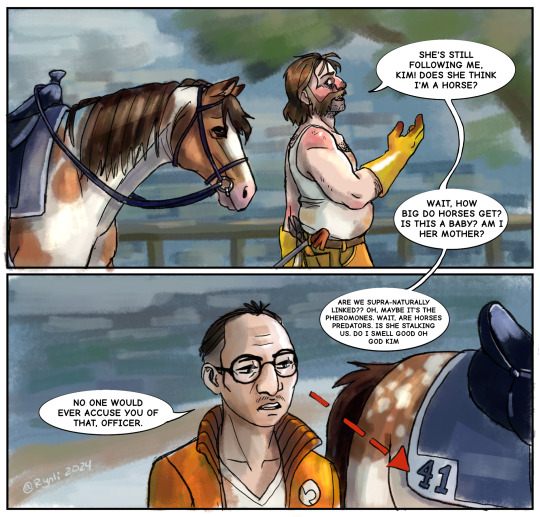#Logic
Explore tagged Tumblr posts
Text
Well, this would LOGICally be an
01000001 01100011 01100011 01101001 01100100 01100101 01101110 01110100 01100001 01101100 00100000 01000110 01100101 01100001 01110010 00100000 01100001 01101110 01100100 00100000 01001000 01110101 01101110 01100111 01100101 01110010 00100000 01110010 01100101 01100110 01100101 01110010 01100101 01101110 01100011 01100101 00100000




#fear and hunger#funger#accidental funger ref#fear and hunger termina#fear & hunger#f&h#accidental fandom reference#accidental funger reference#gimmick account#logic#logic fear and hunger#binary code
10K notes
·
View notes
Text

What I Think.
And more arguments.
63 notes
·
View notes
Text
i nneed to be scratched on the snout i need to rub my snout against things
34 notes
·
View notes
Text



from what Jean says, they got the MC very recently… some vignettes about how the vehicle quest would go if Harry still had his horse
Bonus horrible thumbnails under the cut


#disco Elysium#Harry du bois#Kim kitsuragi#disco Elysium skills#cuno de ruyter#fanart#logic#authority#horse#comic#I have a goal to draw him more fucked up eveey time#I didn’t realize until after coloring that he has the EXACT same expression in the third page as his player portrait#it’s fine it’s just canon#rynArts#this coloring style takes so much longer but I feel compelled to do it#for disco
2K notes
·
View notes
Text
"Harassing people is not going to help the cause and instead is only going to sour it."
"Y'all deserve more harassment."
Sigh.

148K notes
·
View notes
Text
If you see articles and tweets about how the Star of David is now a symbol of fascism and think to yourself "maybe they have a point," then whatever you define as your antizionism has absolutely crossed the line into antisemitism
The Star of David is one of the most important symbols in Judaism. The fact that it is on the flag of Israel does not make it fascist. The government of Israel is separate from the symbol. Labeling such a widely used symbol by a marginalized people as fascist is incredibly dangerous and seeks to conflate Jews as a whole with the Israeli government- something antizionists continually claim people shouldn't do. So why are some doing it?
High control groups slowly ease you into believing nonsensical things. They provide "reasoning" and "logic" which goes largely unchallenged within echo chambers. People in these echo chambers are prone to believing it because they start to see it as real logic instead of bigoted, twisted reasoning. Even otherwise intelligent people can fall for their prejudices as they begin to view it as a form of justice
It is a fantasy that high control group leaders go from 0 to 100 in five minutes or refuse to answer any questions- they are usually much more manipulative
Please confront your biases. The Jews are tired
#jumblr#jewish#jews#jew#antisemitism#antisemites#antisemitic#bias#social justice#liberal#justice#judaism#feminism#intersectional feminism#intersectionality#star of david#religion#left#leftist#high control groups#echo chamber#marginalized communities#logic#fascisim
3K notes
·
View notes
Text

I CAN FEEL YOUR FEAR AS YOU TREAD THE ENDLESS EXPANSE OF MY MIND
2K notes
·
View notes
Text
mathematical revelation so great i almost became religious
1K notes
·
View notes
Text
The fun thing about the knights and knaves puzzle is that no matter what goofy variant you come up with, not only has it already been considered, some maniac has worked out the optimal solution. What if there's a third guard who lies or tells the truth at random? It's been done. What if the guards will only answer yes/no questions, and also for some reason they understand your language but refuse to speak it, and you don't know which of the two words they may respond with means "yes" and which means "no"? Literal thesis papers have been written on that one. Logicians are absolute freaks for these guys.
3K notes
·
View notes
Text
why do baby seals look like they're on the verge of tears constantly. they legit have NO reason to be that upset.

#silly#relatable#seal#seals#sea creatures#why#memes#this doesnt make sense#logic#cute animals#baby animals
617 notes
·
View notes
Note
Why do you ship shoko and geto even tho shoko flat out said she wouldn’t date him and or gojo? I’m sorry if this rude I’m just genuinely curious what do you see in the ship
she said she wouldn’t date them, she never said anything about not getting freaky nasty and mashing parts with them dirty style
403 notes
·
View notes
Text

678 notes
·
View notes
Quote
The habit of logical thinking kills imagination.
Lev Shestov, All Things Are Possible
#philosophy#quotes#Lev Shestov#All Things Are Possible#logic#reason#rationality#creativity#imagination
664 notes
·
View notes
Text
It's so funny to me that people think of Math/Mathematicians as being hyper-logical and rational. Like, have you seen some of the wild things hiding in the Math?
Did you know there are non-computable numbers?? (https://en.wikipedia.org/wiki/Chaitin%27s_constant)
Did you know that there are things that are true, but we can't prove them??? (https://en.wikipedia.org/wiki/G%C3%B6del%27s_incompleteness_theorems)
Did you know that we can prove that something exists, and yet never actually figure out what that thing is?? (https://mathworld.wolfram.com/NonconstructiveProof.html)
Math is crazy. Math is wild. Math hardly makes sense, and when you think you understand the weirdest parts of it, everyone who hears you explain it to thinks you're a gibbering lunatic.
"In mathematics you don’t understand things. You just get used to them." - von Neumann
(please share more unhinged math with me, i want to see more scary math)
#stem#math#mathblr#academics#mathematics#logic#stemblr#academia#proofs#computer science#theoretical computer science
3K notes
·
View notes
